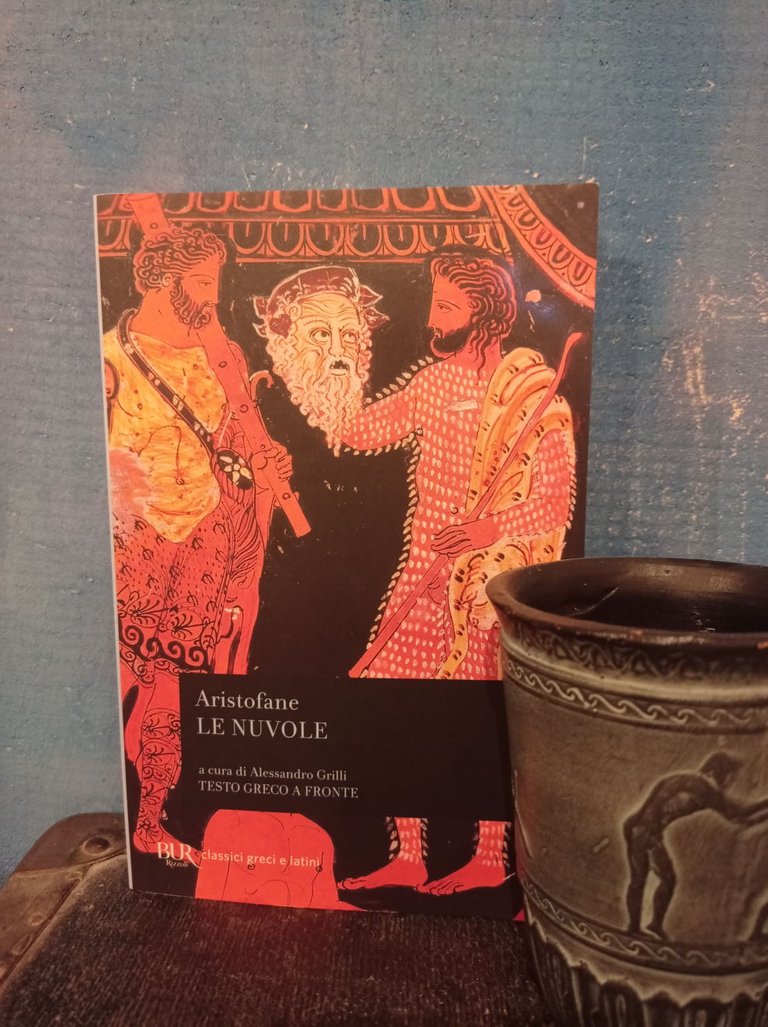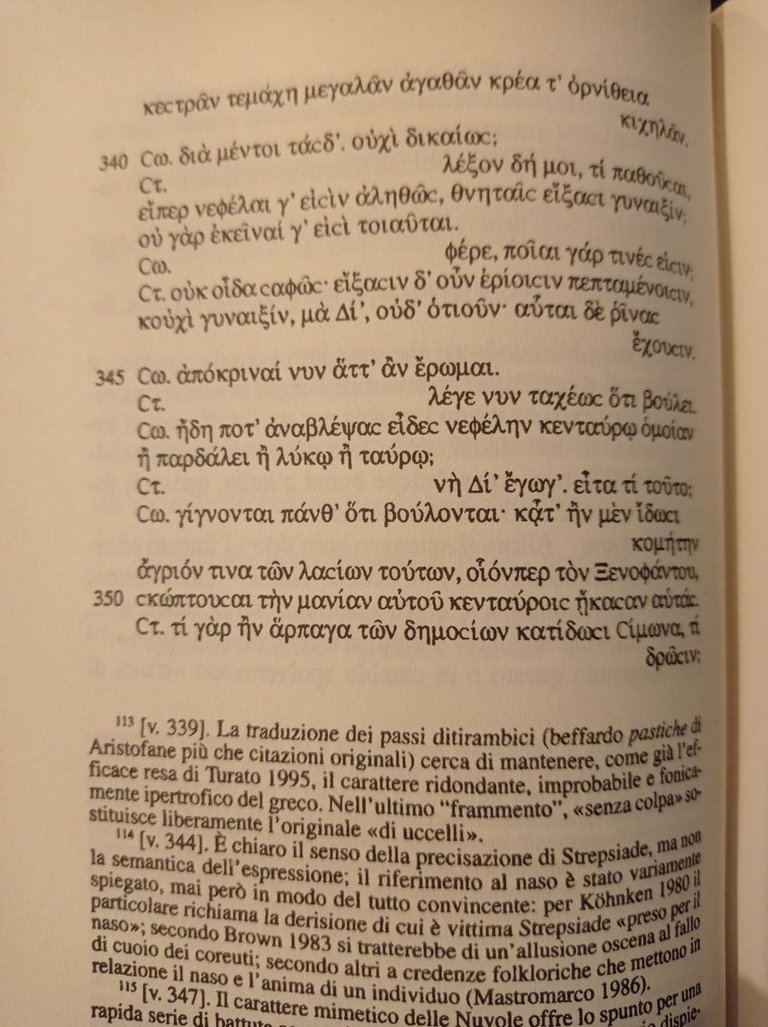Scroll down to read the Polish version!
Neither the prolonged weekend, tempting everyone to leave our metropolis for a while, nor the sudden rainfall stopped us. Another monthly meeting of the Book Club began as planned. This time our friend Kamil made us abandon 19th and 20th-century books and go to the very roots of literature, namely the ancient Greek comedy Clouds by Aristophanes.

We are travelling back to Athens of the classical era with Strepsiades, a man who has few reasons to feel happy. This inhabitant of the Athenian countryside has fallen into debt through the fault of his wife, a lover of luxury, and his son who is a little too enthusiastic about horse racing. In an act of despair, he decides to visit the city and find the 'Thinkery' of the famous philosopher Socrates, so that there he can learn the art of twisted, eristic speech and thus get rid of his creditors. He does indeed do so, but fails the test of reasoning imposed by the master of eloquence and is deemed by him to be completely unsuitable for a philosopher. Socrates, however, suggests that our seeker of knowledge sends his son, Phidippides, to him for tuition. This experiment ends very badly: upon his return to his father's house, the young man turns out to be someone altered to knowledge, and for the worse. He openly shows disregard not just for his father, but also for tradition, gods and proper manners. In the end, it seems that Strepsiades' cunning idea to get out of debt failed and brought him even more misery.
A Greek comedy
As we have done before at our meetings, we began the conversation by comparing the versions of the book we had read. Most of the club members chose the Polish edition available on the Wolne Lektury website with an extensive introduction explaining the circumstances of the work and its meaning, as well as fairly detailed footnotes. A similar 'professional' edition, but in Italian (see the photo), was chosen by the informal chairman of our club, Lorenzo (@lpa). For myself, I chose a 19th-century translation downloaded from the Project Gutenberg archive. As it turned out, this was hardly a valid choice due to the lack of any commentary or footnotes, and the translator's rather puritanical approach to the more... spicy fragments of the text.
Finally, we moved on to discuss the main theme of Aristophanes' comedy. We all agreed that the seemingly light-hearted tone of the work conceals an attack on Socrates and his disciples and, looking more broadly, on the philosophers of the new school, identified in the text with the sophists. The comedy portrays them as unbalanced and hypocritical charlatans whose teachings spoil the younger generation, here represented by Phidippides, son of Strepsiades. This young man, after leaving the school of Socrates, changes beyond recognition and becomes an arrogant man, despising Athenian tradition, classical song and art, and on top of this, disrespectful towards his father--so much so that with eristic tricks he justifies the rightness of beating his own parents, which for the Athenians of old was not only outrageous but even a violation of the law.
This approach by Aristophanes, however, was criticised by one of us, who in doing so referred to two treatises defending Socrates, being the work of Plato and Xenophon. The direct equation of Socrates and his disciples with sophists and other grifters seemed profoundly unfair to him, as did the portrayal of the philosopher as a madman and a hoaxer. As we can see, thousands of years after he wrote his work, Aristophanes is still having trouble convincing the reader of his rationale--as we learn from the commentary to the Polish edition of The Clouds, his Athenian contemporaries also tended to disagree with this portrayal.
Side notes
After a while, the conversation became a little looser, although still linked to the topic of the meeting. We considered how close or distant we were to the Athenian contemporaries of Aristophanes and Socrates. We also touched on the topic of religiosity in ancient Greece, its influence on the organisation of daily life of the polis and how it influenced the individual in that community. This time the usual question 'how did you like the work of the Great Classical Author' was never asked, but judging by the fact that the discussion lasted more than two hours and was lively and at times even emotional, it can be concluded that Clouds is worth reading and worth talking about--over two millennia after it was first performed on stage.
WERSKA POLSKA
Ani przedłużający się weekend, kuszący przecież do opuszczenia na chwilę naszej metropolii, ani nagłe opady deszczu nie zatrzymały nas. Kolejne comiesięczne spotkanie Book Clubu rozpoczęło się zgodnie z planem. Tym razem nasz przyjaciel Kamil (@szmulkberg) sprawił, że porzuciliśmy książki XIX i XX-wieczne i udaliśmy się do samych korzeni literatury, a mianowicie do starożytnej greckiej komedii Chmury Arystofanesa.

W podróż do Aten ery klasycznej wybieramy się razem ze Strepsiadesem (w polskim tłumaczeniu: Wykrętowicem), człowiekiem bez wątpienia nieszczęśliwym. Ten mieszkaniec podateńskiej prowincji popadł w długi z winy swojej żony, miłośniczki luksusów, i bawiącego się w wyścigi konne syna. W akcie rozpaczy postanawia udać się do miasta i odszukać „pomysłownię” słynnego filozofa Sokratesa, aby tam nauczyć się sztuki pokrętnej, erystycznej mowy i dzięki temu pozbyć się swoich wierzycieli. Tak rzeczywiście czyni, ale nie przechodzi próby rozumowania narzuconej przez mistrza krasomówstwa i zostaje przez niego uznany za materiał zupełnie nie nadający się na filozofa. Sokrates proponuje jednak naszemu poszukiwaczowi wiedzy, by ten przysłał do niego po naukę swojego syna, Fidypidesa. Ten eksperyment kończy się bardzo źle: po powrocie do domu ojca młody człowiek okazuje się kimś odmienionym nie do poznania, i to na gorsze. Otwarcie okazuje lekceważenie nie tylko swojemu ojcu, ale też tradycji, dobremu i obyczajowi. Wszystko wskazuje na to, że szczwany pomysł Strepsiadesa na wywinięcie się od długów nie tylko skończył się fiaskiem, ale przyniósł mu jeszcze więcej nieszczęść.
Komedia po grecku
Jak już wcześniej bywało na naszych spotkaniach, rozmowę zaczęliśmy od porównania wersji książki, które przeczytaliśmy. Większość klubowiczów sięgnęła po wydanie polskie dostępne na serwisie Wolne Lektury opatrzone obszernym wstępem wyjaśniającym okoliczności powstania utworu i jego wymowę, jak również dosyć szczegółowymi przypisami. Podobne „filologiczne” wydanie, tyle że w języku włoskim (patrz zdjęcie), wybrał nieformalny szef naszego klubu, Lorenzo (@lpa). Sam posłużyłem się XIX-wiecznym tłumaczeniem ściągniętym z archiwum Projektu Gutenberg. Jak się okazało, był to wybór mało słuszny ze względu na brak jakiegokolwiek komentarza czy przypisów, a także dosyć purytańskie podejście tłumacza do bardziej... soczystych fragmentów tekstu.
W końcu przeszliśmy do sedna, czyli głównej tematyki komedii Arystofanesa. Wszyscy zgodziliśmy się, że pozornie lekka wymowa dzieła kryje za sobą atak na Sokratesa i jego uczniów, a patrząc szerzej, na filozofów nowej szkoły, w tekście identyfikowanych z sofistami. Chmury przedstawiają ich jako niezrównoważonych i zakłamanych szarlatanów, których nauki psują młode pokolenie, tu reprezentowane przez Fidypidesa, syna Strepsiadesa. Ten młody człowiek po opuszczeniu szkoły Sokratesa zmienia się nie do poznania i staje się arogantem, gardzącym ateńską tradycją, klasyczną pieśnią i sztuką, a do tego pozbawiony szacunku wobec swojego ojca--do tego stopnia, że erystycznymi sztuczkami uzasadnia słuszność bicia własnych rodziców, co dla ateńczyków starej daty jest nie tylko zgorszeniem, ale wręcz złamaniem prawa.
Takie podejście Arystofanesa zostało jednak skrytykowane przez jednego z nas, który powołał się przy tym na dwa traktaty broniące Sokratesa, będące dziełem Platona i Ksenofonta. Bezpośrednie zrównanie Sokratesa i jego uczniów z sofistami i innymi szarlatanami wydało mu się głęboko nieuczciwe, tak samo jak przedstawienie filozofa jako szaleńca i hochsztaplera. Jak widać, tysiące lat po napisaniu swojego dzieła Arystofanes wciąż ma kłopoty z przekonaniem czytelnika do swoich racji--jak dowiedzieliśmy się z komentarza do polskiego wydania Chmur, również współcześni mu Ateńczycy raczej nie zgadzali się z takim przedstawieniem sprawy.
Wątki poboczne
Po pewnym czasie rozmowa zrobiła się trochę luźniejsza, chociaż wciąż powiązana z tematem spotkania. Zastanawialiśmy się nad tym, na ile bliscy albo dalecy są nam Ateńczycy współcześni Arystofanesowi i Sokratesowi. Poruszyliśmy też temat religijności w starożytnej Grecji, jej wpływu na organizację życia polis i sytuację jednostki w tamtej społeczności. Tym razem nie padło sakramentalne pytanie „jak spodobało wam się dzieło Wielkiego Klasycznego Autora”, ale sądząc po tym, że dyskusja trwała ponad dwie godziny i była ożywiona, a momentami nawet emocjonalna, można uznać, że Chmury warto czytać i warto o nich rozmawiać--ponad dwa milennia po tym, kiedy po raz pierwszy została wystawiona na scenie.

